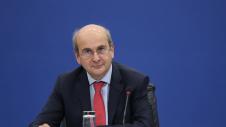Messages received by local executives from foreign real estate companies on investor interest in Greek hotels are optimistic. There may be a general "numbness" in the market in the short term, but the feeling is that conditions will improve by the fourth quarter of the year.
This year's performance of the tourism sector will play an important role in this development, as even a partial reopening of the industry is expected to strengthen buying interest in hotels.
Niki Symboura, CEO of Cushman & Wakefield Proprius, said in a recent online discussion organized by Prodexpo that "the information we have from our partners abroad is that there are still several foreign investors interested in being positioned in the Greek market. Of course, in the coming months, there will be a decline in sales, but we believe that there will be a recovery by the end of the year. "
According to Symboura, “there is interest both for seaside resorts, where Greece is one of the top destinations in Europe, along with Spain and Portugal, as well as for city hotels ", she added.
1 billion euros in foreign investments
However, it is clear that performances seen in previous years will not be repeated in 2020, in terms of foreign investment inflows. Based on data from Proprius, a total of 1 billion euros was invested in Greek real estate, from domestic and foreign institutional investors, last year.
Of this amount, 25 percent or about 250 million euros, went to hotel properties, which was the second most popular category of real estate after office buildings, that accounted for 55 percent of total investment. Even more importantly, 800 million euros, ie 80 percent, came from foreign investment funds, mainly private equity, but also family offices, ie family-run capital management companies.
Investment pause
These funds will be absent for a while, not only from the Greek market but also internationally. As Paul Gomopoulos, head of the Greek division of the US real estate group Hines, pointed out in the same discussion, that "in recent years, several foreign investment funds either did not look at the Greek market or considered it to be an exotic investment destination. This had changed in recent months and a number of them had been looking at specific investment goals and investments. But now, with the pandemic, it is clear that it will be difficult to see an increase in foreign direct investment, as the problem is global and not Greek. "
According to Gomopoulos, the consequences will, first of all, be the immediate decline in investment deals, as most of the foreign funds are mainly interested in the hotel industry. "Unfortunately, the blow is twofold, as not only is there a complete overhaul of investment strategy, but hotels, which were the main target of foreigners, are hardest hit," said Gomopoulos.
Looking ahead, he added that certain investment and reconstruction projects will be delayed for at least the next 2-3 years, along with a decline in hotel property values. This will happen because their revenues will be lower, a factor that directly reflects on their valuations. On the other hand, this fall in prices is likely to create new investment opportunities, at least for those investors willing to take on more risk.









